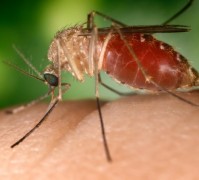
2nd case of West Nile virus reported in Nevada
2nd case of West Nile virus reported in Nevada
In August, the Southern Nevada Health District (SNHD) announced that mosquitoes were detected in the 89107 zip code that tested positive for the West Nile virus. These findings indicated that it would be only be matter of time before humans became infected in Nevada.
The first case of West Nile virus in Clark County for 2012 was announced last week. A 75 year old woman is currently hospitalized with the more serious neuroinvasive form of the virus.
The 2nd case of West Nile virus reported in Nevada is located in Churchill County. The information released says that he victim is over 50 years of age and has also contacted the neuroinvasive form of the virus.
Interestingly, a horse in Churchill Country was euthanized after contracting the virus last month.
The West Nile virus is transmitted by the bite of an infected mosquito and cannot be transmitted person to person. The mosquitoes become infected after feeding on infected birds.
West Nile was first detected in Nevada in 2004.
The Centers for Disease Control and Prevention (CDC) notes that as of September 18th, 3,142 cases of West Nile virus have been reported including 134 deaths from the virus.
The quick rising figures of people infected with West Nile virus continues to grow.
Last month, there were 1118 cases reported. Shortly thereafter the figure rapidly increased to 2600 with 118 deaths linked to the sometimes deadly virus.
Over 50% of the reported cases were classified as more serious neuroinvasive form of the virus; the type that both of the people infected in Nevada have contracted.
With the 2nd case of West Nile virus reported in Nevada, it is likely that there will be more cases reported so in order to minimize your chances of contracting the sometimes fatal virus, prevention is the best measure.
Wearing long sleeves shirts and pants with an insect repellent containing DEET is highly recommended if you are going to be outdoors, particularly between dusk and dawn when mosquitoes are most active.
Dogs and cats can contract the virus too, however they are less likely to become ill and there is no evidence of contracting the virus from an infected pet.
Here are more recommendations to protect yourself against contracting the West Nile virus.
Related articles





 Follow
Follow


